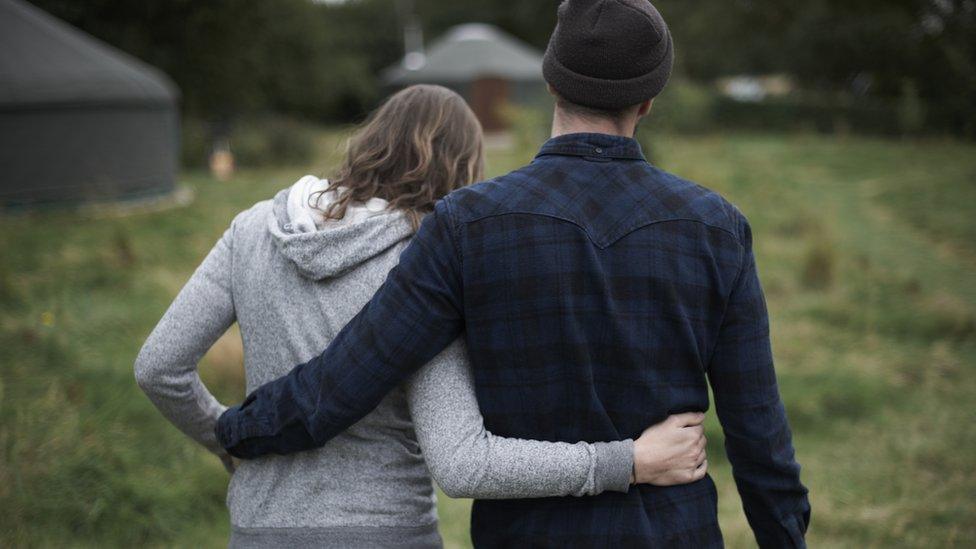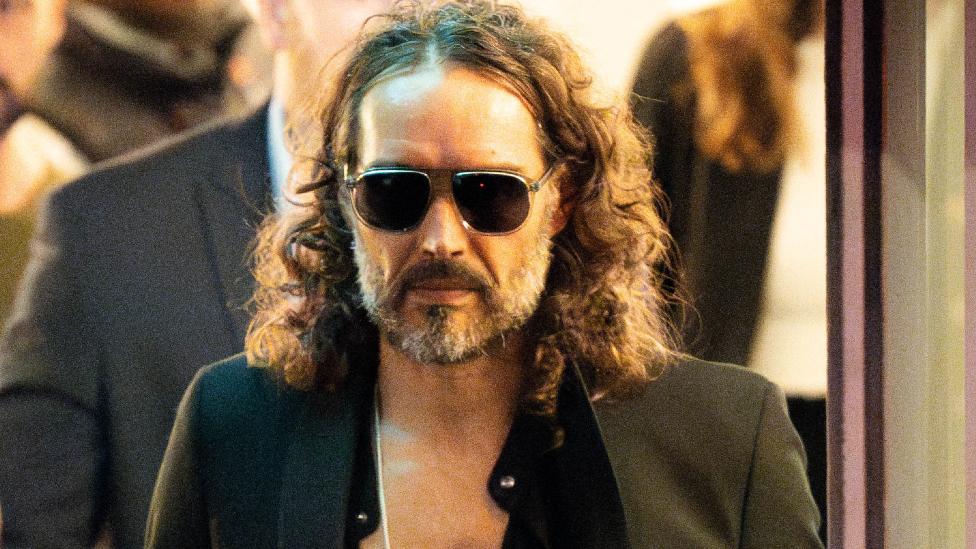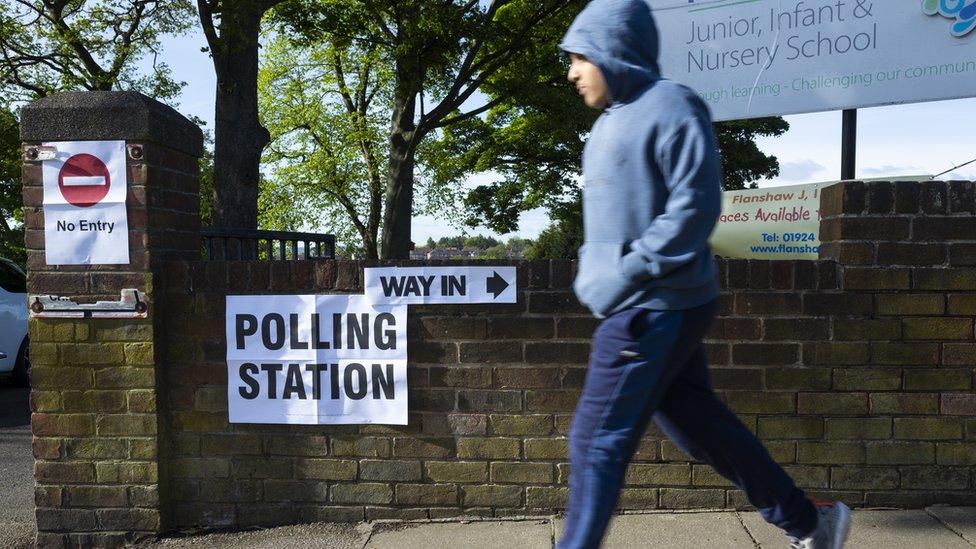Russell Brand accuser sparks debate about staggered age of consent
- Published

At 16, you can't legally buy alcohol, place a bet or vote in a general election - but you can consent to sex.
It has been this way since 1885 in the UK, when the age of consent was raised from 13. For gay and bisexual men, the age of consent was reduced from 18 to 16 in a law change in 2000, after a long campaign for equality.
But now, people are debating if consent laws should be changed again. This time, discussion has been triggered by allegations made against Russell Brand - in particular, those made by one alleged victim, "Alice", who says she had a relationship with Brand when he was in his 30s and she was 16.
Alice told the Sunday Times and Channel 4's Dispatches, external that Brand sexually assaulted her, and that, looking back, she feels she was groomed by him during their relationship. Brand denies her allegations.
Due to the fact she was over the age of sexual consent at the time, Alice says it would have been difficult for anyone to raise concerns about their relationship to the police.
But Alice believes we should start considering a change to the law in the form of "staggered ages of consent", so that people over 18 would not be allowed to have sex with 16 and 17-year-olds.
"There's a reasonable argument [that] individuals between the ages of 16 and 18 can have relations with people within that same age bracket," she told BBC Women's Hour. "You're allowed to make mistakes as a teenager, they should be with other people your own age."
This view has been echoed by many people on social media, with some commentators floating ideas, external such as restricting those under 18 to sleeping with those under 21.
But would a change in the law protect 16 and 17-year-olds from harm? And could it criminalise healthy relationships that happen to have an age gap?
While sex involving one or more people under 16 is illegal, police use discretion to decide whether a prosecution is in the public interest. They take into account factors such as the relationship between the people involved, whether the underage person consented to what happened and how close in age the people were.
If a person is under 13, they cannot be seen as consenting in law - even if they say they consented.
It is already illegal to take, share or possess indecent images of people under 18 - even if the person is a consenting 16- or 17-year-old.
It is also against the law for people in a position of trust, such as teachers, to engage in sexual activity with a child in their care, even if that child is over the age of consent.
But what if special protections were introduced more widely for sexual relationships involving those who are over the age of consent, but still children?
"My view would be that changing the law doesn't actually achieve a lot," says Roger Ingham, director of the Centre for Sexual Health Research at the University of Southampton.
He says one of the arguments for having an age of consent is that it allows people who may feel pressured to have sex under 16 to say, "it's against the law".
"How often that's actually used, how often that stops people having sex that they don't want, we don't know."
He says surveys suggest that by the time they reach 18, the majority of people - about 60 to 70%, he says - have had sex (usually defined as intercourse).
But if the age of consent were to be raised to 18, for example, he says this would be "bringing in an awful lot of people into the bracket of being criminalised, even if the practice of the police and the prosecution is not to prosecute under certain conditions".
He says teenagers in consensual relationships below the age of consent - for example two 15-year-olds - are often nervous about going to family planning clinics to seek contraception in case they are reported - so one risky consequence of raising the age of consent could be more young people having unprotected sex.
In reality, sexual health clinics keep underage patients' details confidential, unless they are under 13 and thought to be at risk of harm, in which case other services may be alerted.

Brand denies the allegations of rape, sexual assaults and emotional abuse
Prof Ingham says more comprehensive sex and relationships education could help protect 16 and 17-year-olds, adding there should be "much more attention paid to issues of consent, not just in sexual situations".
Jayne Butler, chief executive of the charity Rape Crisis, agrees that better sex and relationship education and increased understanding are needed to shift societal attitudes around consent.
"We don't want to criminalise consensual relationships between 16-year-old peers, but there needs to be recognition of the significant power imbalance between older men and 16 year olds," she says.
"The cultural acceptance of relationships between young, potentially vulnerable people and someone much older needs to be addressed, and this doesn't start or end with just changing the law."
Prof Ingham says the issue of consent is challenged when someone with power or status, such as a celebrity, takes an interest in a young person.
A "star-struck" young person may be willing to have sex at the time but may regret it later, he says.
"It's a really complicated psychological issue, I'm not sure how you can legislate for it, to be honest."
Dr Laura Janes, from the Law Society's criminal law committee, also points out that the law in this area is already quite complex.
"What many people find confusing is we have different ages of consent for different things," she says - highlighting that in the UK someone is considered criminally responsible at 10 but can't have sex until 16 or vote in a general election until 18.
"If you take these three dates of what the law thinks you can do in terms of your development, we have already got a law which is very incoherent and inconsistent," she says.

A 16-year-old in the UK is allowed to have sex but not vote in a general election
The age of consent in England and Wales is broadly similar to other European countries - slightly higher than France's 15 and Germany's 14, but lower than Ireland's 17 and Malta's 18. However, the gap between the age of criminal responsibility and the age of consent in England and Wales is the biggest of all countries, she says.
"It's important to remember the law is a very blunt instrument and creates black and white lines," Dr Janes says.
And, crucially, the law changes according to the moral values of society, she says - so you have to take into account the cultural reality. She highlights YouGov research from earlier this year, external that shows a fifth of people say they had sex before the age of consent.
On top of this, she says one of the problems with English law is there has been a "proliferation in the number of laws we have". And the question is what another law change would achieve, when there are other current laws - for example, against coercive control - which aim to protect young people from the kind of harmful relationships that can happen when one partner is older.
"There's been a huge number of new offences that have appeared on the statute book and there is a real risk of it becoming overcomplicated," she says.
Dr Janes says that before any law change is considered, the priority should be making sure young people understand what the current law is - and then ensuring they know they can use it with confidence. "There needs to be a cultural understanding where people feel sufficiently confident to go to the police," she says.
And if there are going to be any legal changes, particularly if they involve intimacy and relationships between young people, "it has to be really clear and it has to be understandable to everyone, including potential victims and potential perpetrators".
Related topics
- Published19 September 2023
